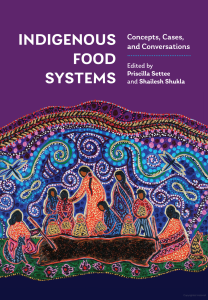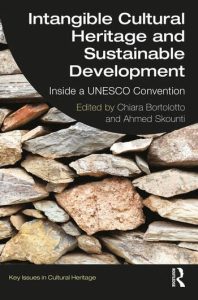I. Recommended Readings
This section includes books and an article and website that expand on themes regarding ICH. Click on the title to access the resource.
Settee, Priscilla and Shailesh Shukla. 2020. Indigenous Food Systems: Concepts, Cases, and Conversations, Canadian Scholars Publishing

The book discusses Indigenous Food Systems and highlights the food-related health disparities among First Nations, Métis, and Inuit people in Canada. The authors outline promising solutions to decrease food insecurity and promote the well-being of Indigenous people. The book provides practical resources including research and case studies implemented by Indigenous and non-Indigenous food scholars and community practitioners that examine the characteristics, practices and challenges of Indigenous food systems across Canada. The authors discuss collaborative initiatives between Indigenous communities, organizations, and non-Indigenous allies that address the colonial and ecologically damaging food systems monopolization practices.
Additionally, this book provides strategies to revitalize Indigenous food systems that can be used by policymakers, practitioners, researchers and students in Indigenous studies, public health, anthropology, and the social sciences.
Chapter 4 in the book, Aki Miijim (Land Food) and the Sovereignty of the Asatiwispe Anishinaabeg Boreal Forest Food System, expands on the lessons learned by Pawlowska-Mainville in the course she discussed in the chapter Teaching Food Systems through Living.
Bortolotto, Chiara and Skounti, Ahmed. 2024. Intangible Cultural Heritage and Sustainable Development Inside a UNESCO Convention. Routledge Taylor & Francis.

This book expands on the themes discussed in the chapter Teaching Food Systems through Living Heritage: Enhancing Academia with Intangible Cultural Heritage (ICH) Pedagogies by highlighting existing debates about local and international intangible cultural heritage (ICH) and exploring the theoretical and practical implications of the connecting the policy fields. The book challenges how sustainable development priorities influence ICH representation and highlights the disconcerting, yet currently accepted, understandings of heritage.
Article:
Pawłowska-Mainville, A. and Yvonne Pierreroy. 2020. “Duni zuz ‘utilnilh, ‘tanning moose hide’: weaving Dakelh (Indigenous) intangible cultural heritage transmission with academia.” International Journal of Intangible Heritage. v.15: 90-101.
This article expands on the themes discussed in the chapter Teaching Food Systems through Living Heritage: Enhancing Academia with Intangible Cultural Heritage (ICH) Pedagogies because it highlights how Indigenous Canadian communities are revitalizing their cultural heritage by working with higher learning institutions to protect the knowledge and land-based practices of their heritage. The authors use a case study of Dakelh (Indigenous) knowledge-holders to demonstrate how Indigenous communities merged traditional moose-hide tanning with academic components surrounding cultural heritage issues. The authors discuss the methodology employed, as well as the benefits and challenges, of an experiential-learning university course they developed that grounded theoretical issues in Indigenous cultural heritage. The authors note how combining traditional and academic methodologies in a university setting can help Indigenous communities transfer their intangible cultural heritage to younger generations.
Website:
Carrier Linguistic Society. 2008. ‘Ustas Stories’. Carrier Linguistic Society.
This website expands on themes of intangible cultural heritage (ICH) discussed in the chapter. The Carrier Linguistic Society (CLS) The CLS is a First Nations Organization Incorporated into the Societies Act of British Columbia in 1973 by the Nak’azdli community. The purpose of the society is to promote, regulate and support language and cultural programs by producing literature, training teachers, coordinating with First Nations organizations and universities to create professional positions, and exposing schools to Dakelh language and cultural studies. The website contains information on the organization’s members, the history of the organization, access to publications produced by the organization and information on projects, news, events, and career opportunities.
